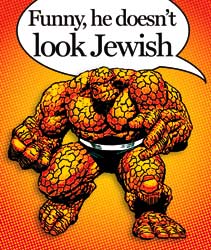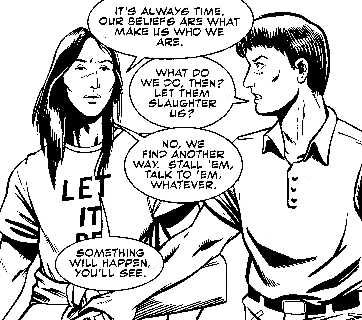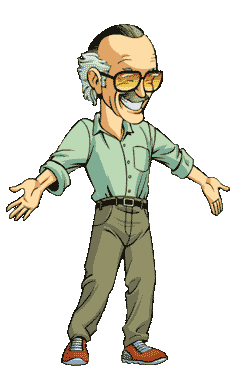

Comic-book heroes seldom reveal their faith
Recent revelation of the Thing's religion was a rare moment for pop culture
08/24/2002
By JEFFREY WEISS / The Dallas Morning News
The thing is, the Thing is Jewish.
That's a statement probably worth a double-take for the millions of people -- mostly former teenage boys -- who grew up with the characters of the Fantastic Four comic book.
And even for those who ignored or sneered at comics -- moms, pay attention here -- it's a small indication of a shift in the way our culture deals with faith.
That Benjamin Jacob Grimm -- a huge, orange, lumpy, enormously strong caricature of a human being -- blue-eyed idol of millions and his Aunt Petunia's favorite nephew, should be Jewish after all these years, who knew?
Well, lots of people say they knew, unofficially. But to have it actually appear in the plot of the comic book more than four decades after the character was "born," that's a different thing entirely. And that's what happened recently: Ben Grimm was explicitly identified as Jewish for the first time in an issue titled Remembrance of Things Past.
How far past? The Fantastic Four was created for Marvel Comics in 1961 by writer Stan Lee and artist Jack Kirby. Fans immediately recognized the story as a seismic shift away from square-jawed, flawless heroes like Superman who lived in places called "Metropolis" and toward bollixed-up human characters who flail around New York City.
Even the origin of the FF (as the comics cognoscenti call them) was a snafu. Four friends, including test pilot Ben Grimm, were accidentally exposed to radiation during a rocket test and returned to Earth with various superhuman powers. Together they became sort of super family with recognizably ordinary squabbles to settle among themselves while they battled super villains. Ben's blue-collar battle cry became "It's clobberin' time!"
The success of the FF begat Spider-man, the Hulk, Daredevil, the Punisher, Blade, and the X-Men (just to choose characters who have come or will be coming soon to a movie theater near you) and dozens of others. The FF success woke up DC Comics -- home of Superman, Batman and other costumed heroes -- which started adding fascinating, fallible traits to its lineup.
Over the years, the writers told readers all kinds of things about the habits and foibles of the characters. We knew about their taste in clothing, their troubles with relationships, their sense of humor. But we rarely discovered whether they followed any particular religion.
That seems odd in one way. Back in the dawn of the modern comic book, more than 90 percent of Americans self-identified with a particular religion, mostly some kind of Christianity. Why wouldn't reality-linked superheroes have a particular religion?
But American popular culture, at least in second half of the 20th century, was vague about the faith of fictional icons. What church did Lucy Ricardo attend? What kinds of prayers did Matt Dillon say? What kind of wedding did Ben Cartwright have? Nobody knew, or at least the creators didn't tell us. So when the creators of the Fantastic Four came along, they followed suit.
"I wanted these stories to be palatable for readers of every type," Mr. Lee said recently. "My one 'religious' precept was, Do unto others as you would have them do unto you. Treat people the way you would want to be treated."
Playing it safe
Partly, comics writers have stayed away from explicit religion to avoid offending. "Nobody is not going to buy a comic because they don't use religion as part of the story," said Maggie Thompson, editor of the Comics Buyer's Guide.
But there's another reason, said Tony Isabella, a writer on more than a dozen comics, including Spider-Man, the Fantastic Four, Mickey Mouse and Superman.
"So many writers have no background in anything but popular entertainment," he said. "They don't have faith of any kind. They don't have a historical or social context."
For whatever reason, only a tiny percentage of the hundreds of characters that have appeared in comics have been attached to any particular faith. But it turns out that Jack Kirby, an active, synagogue-attending Jew, had a faith in mind for at least one of his characters.

Mr. Kirby (born Jacob Kurtzburg) was an irascible, cigar-smoking, wryly funny product of New York City's tough Lower East Side. So was his co-creation, Ben Grimm.
Mr. Kirby died in 1996, but members of his family and many of the folks who worked for Marvel Comics over the decades say they knew that Mr. Kirby always thought of the Thing as a sort of alter-ego -- and Jewish. In fact, Mr. Kirby once drew the Thing wearing the traditional Jewish skullcap and prayer shawl and holding a prayer book.
Mr. Lee (born Stanley Leiber) and Mr. Kirby were not the only Jewish creators behind famous comic characters. Jerry Siegel and Joe Shuster, two Jewish teenagers from Cleveland, dreamed up Superman almost 25 years before the birth of the FF.
The Man of Steel's origin was even a loose adaptation of the story of Moses. Moses' mother floats the baby in a basket on the Nile to save his life. He's rescued and becomes a mighty hero. Kal-El's parents put their baby in a rocket to save his life and he's rescued and becomes a mighty hero.
A few mentions of religion have crept into mainstream comics. And the dedicated legion of fans who are indescribably attentive to the smallest details of the comics know all about them. John Wells is one of the most dedicated. Mild-mannered department store manager by day, his not-exactly-secret identity is the compiler of one of the nation's best-known databases about comics characters.
Mr. Wells found an offhand religious reference in an editor's reply to a letter writer in a 1962 issue of SUPERBOY. "An editorial response notes that Superboy 'has completely memorized both Testaments of the Holy Bible, the Constitution of the United States, Webster's Dictionary and -- last but not least -- the Smallville Telephone Directory!' " said Mr. Wells.
But is Superboy a Lutheran or Episcopalian or Baptist -- or even Christian? We don't know.
Light side, dark side
There have been a few characters over the years whose faith has been made explicit. Daredevil, the blind superhero who will be played by Ben Affleck, is Catholic. Nightcrawler, a member of the X-Men who may make it into the next movie, is considering becoming a Catholic priest.
But their religion will not be a part of the upcoming movies. Neither is Ben's faith a part of the plan for the FF movie, or the Punisher's for that character's movie, Marvel officials said. Marvel Studios CEO Avi Arad declined to explain why faith wasn't woven into the scripts. But comics industry experts said it was for the same reason religion hasn't been a big part of the books: Not offending is safer.
Oddly, the dark side of faith has been well represented over the years by demons from Hell and even Old Scratch himself. For instance, Mr. Lee used a variant of Satan as a villain in his Silver Surfer comic.
"I didn't think of it as religious. I figured, I'm going for the worst villain I could come up with and I got Satan." he said. "I called him Mephisto."
But the faith of the marquee players in mainstream comicdom has mostly stayed mysterious.
The mystery ended for the Thing a few months ago, when writer Karl Kesel suggested to editor Tom Brevoort -- neither is Jewish -- that they should do a story about Ben's Jewish background. Enough had changed in the past four decades that neither felt it was a big deal, at least not in the way their predecessors feared that any mention of religion might offend readers.
In the story, Ben returns to his boyhood neighborhood and saves an old friend, Mr. Sheckerberg, from a bad guy called Powderkeg. In the battle, Sheck goes down and may be badly injured. Ben stands over him, unsure what to do.
"Sheck could be dyin' and I can't do nothin'! No ... No, there is one thing."
And suddenly, it's davening time.
Ben starts davening, or praying in Hebrew. He recites the Shema, the most important Jewish prayer.
Ultimately, Sheck is fine and the bad guy is caught. In the last two panels, Powderkeg looks down at the rocky, orange face of the Thing.
"And you're really Jewish?" he asks.
"There a problem with that?" the Thing growls.
"No! No, it's just ... you don't look Jewish."

That punchline has echoes of anti-Semitic jokes, Mr. Brevoort admitted. But he's had no complaints.
"It's a funny line. And he doesn't look Jewish. He doesn't look anything," he said.
Ben's Jewish roots came as news to Mr. Lee, who said he never thought of the Thing as any particular faith.
"If I had thought of it, I probably would have pushed it aside," he said. "I never tried to get religion into any of my stories."
But the fans who track every word in every comic have tied Mr. Lee with at least one line that some readers think has an explicitly religious theme.
'His only weapon'
In a Fantastic Four from 1968, a really powerful good guy called the Silver Surfer was acting like a bad guy because he wanted to give all of humanity a common foe that could unite us all in a common purpose.
Two FF members, Mr. Fantastic (a.k.a. Reed Richards) and the Invisible Woman (Sue Richards), are now married and off someplace waiting for the birth of their son. The Watcher, another really powerful character who is usually a good guy, appears and sends Reed off to deal with the Surfer.
The visibly pregnant Sue asks, "But what can he do ... against the all-powerful Silver Surfer?"
"All-powerful?" the Watcher replies. "There is only one who deserves that name. And His only weapon ... is love!"
So how about it, Stan? Is that religious or what?
"I thought that was one of the best lines I ever wrote," he said. "I just thought it was such a beautifully dramatic line. And certainly nobody could find any problems with it."
"Is that religious? If that's religious," he said, "I guess I'm religious."
EXPLICITLY RELIGIOUS COMICS CHARACTERS
Jewish:
Bernie Rosenthal, is the non-powered sometime-girlfriend of Captain America.
Colossal Boy, Gim Allon, is a member of the Legion of Super Heroes.
Greenberg the Vampire. He's Jewish. And he's a vampire. Go figure.
Ramban, leader of the Hayoth, an Israeli super-team, is a rabbi and a Jewish mystic.
Rory Regan, the Ragman, has powers derived from Jewish mysticism.
Ruben Flagg, main character in the science fiction title American Flagg, is an actor-turned-lawman. He lost his job as an actor to a computer-generated version of his action-hero character.
Sabra, Ruth Bat-Seraph, another Israel-based superhero, has a star of David on her headband.
Shadowcat, Kitty Pryde, is a member of the X-Men.
The Thing, Benjamin Jacob Grimm, is a member of the Fantastic Four.
The Two-Gun Kid, Matthew Liebowicz, is a Harvard lawyer-turned masked lawman on the Old West.
Christian:
Crossbreed is an evangelical Christian team of superheroes who live in Astro City.
Daredevil, Matthew Murdock, is a blind superhero and is Catholic.
Firebird, Juanita Juarez, is an Avenger and a conservative Christian.
Nightcrawler, Kurt Wagner, is a member of the X-Men and is planning to become a Catholic priest.
Nightwing, Dick Grayson (the original Robin), has dc Talk CDs and a New International Version Bible in his apartment.
The Punisher, Frank Castle, is a former Catholic seminary student
Son O' God, is a wildly irreverent character from several issues of National Lampoon in the 1970s.
Wolfsbane, Rahne Sinclair, a New Mutant, is Scottish Presbyterian.
Other:
Dr. Stephen Strange is Master of the Mystic Arts.
Thor is one of many Norse gods.
Related links
The truth about Spider-Man...revealed!
Some thoughts on minority comics
Culture and Comics Need Multicultural Perspective 2000
More on the future of comics and PEACE PARTY
|
. . . |

|
All material © copyright its original owners, except where noted.
Original text and pictures © copyright 2007 by Robert Schmidt.
Copyrighted material is posted under the Fair Use provision of the Copyright Act,
which allows copying for nonprofit educational uses including criticism and commentary.
Comments sent to the publisher become the property of Blue Corn Comics
and may be used in other postings without permission.